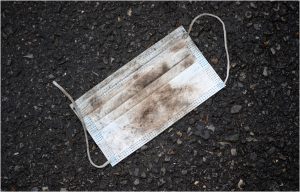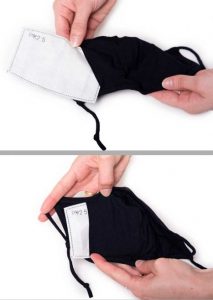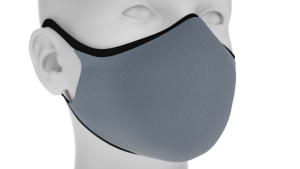Keeping the planet clean as we try keep ourselves safe may be one of the more visible, if less vocalized, concerns expressed about wearing face masks.
But we can see them almost anywhere it is safe enough to walk, and we are becoming increasingly aware of the immense waste produced by single-use masks: sidewalks are littered, garbage cans are full and landfills are overflowing with discarded face coverings.

Three of four disposable face masks will end up where they shouldn’t, according to U.N statistics. Photo by Michael Jin on Unsplash.
According to estimates from the United Nations, some 75 per cent of single–use masks will end up in landfills or oceans.
It’s clear the COVID-19 pandemic is a significant contributor to the increased use of face masks, and that in turn has led to an increase in waste and pollution – not just masks.
But even as the world slowly gets vaccinated against this disease, many anticipate the use of face masks and respirators will continue for some time. It may be mandated in specific industries or workplaces, it may be required in large public settings or gatherings.
It may just be the new normal for people worried about whatever may be in the air: pathogens, pollutants or particulate matter.
No matter why we use them, perhaps no matter even how we use them, a more sustainable solution for making and using face coverings is surely needed, whether that is the innovative use of new materials, the upscaling or recycling of older materials, or the development of effective and reusable face masks.
In terms of recycling, one Canadian company has launched its own PPE (personal protective equipment) recycling program for its products. Vitacore Industries says it feel obligated to address the waste that is a by-product of the increased use of disposable face masks, so it’s providing dedicated recycling bins for its customers and carting away the protective refuse for treating, shredding and the reclaiming of reusable materials from the used masks.
Mackage, a Canadian outerwear company, has a line of non-medical face masks made of upcycled materials that have a lower eco-footprint than other products made of newly sourced materials.

Some reusable washable masks add extra protection layers through the use of small cloth filters that can be inserted into the mark itself. Signature image.
Reusing not just some material but the entire face mask is another strategy for reducing the environmental impact – as long as the mask maintains a recognized degree of protection, comfort and usability.
Face coverings like the Signature Valve Mask are washable and reusable, made from polyester and cotton mix. They are said to offer added protection through the use of a removable filter which slides into a compartment stitched into the mask itself.
But now, a Canadian company called Myant PPE is tackling the challenges of protecting people and the planet with a reusable, washable fabric mask made here in Canada.
Myant PPE is owned and operated by Toronto-based Myant, Inc., which for the last 10 years has been active in the design, engineering and manufacturing of connected textile solutions.
Its new Myant 95 mask is made with three distinct fabric layers that each contribute to the face coverings’ overall protective properties, as explained by Galen Gill, Head of Sales for Myant: the inner layer is made of natural cotton, there’s a middle layer of Lycra, and the unique outer layer is made from hydrophobic polyester using a unique knit structure developed by the Myant engineering team.
The company is very confident in the mask’s protective ability (citing a particulate filtration efficiency greater than 95 per cent, down to 0.1 microns, for the mask material itself; washing may alter the filtration performance) and so it is seeking regulatory certification from Health Canada for its products in a real-world situation.

The Canadian-made Myant 95 mask has an edging layer with a nose and chin bridge, along with adjustable straps for better fit and comfort. Highly rated for its protective abilities, the manufacturer nevertheless points out it is not a medical device and is not intended for medical use. Myant image.
In addition to its capability, the mask has features for comfort: there is an edging layer with a nose and chin bridge, along with adjustable straps for better fit and comfort.
(I tried both the ear and the head strap models; I personally prefer the head strap mask, which seemed to fit me more tightly and securely once I adjusted the straps and molded the nose bridge tightly to my face. I found the mask comfortable to wear and easy to breathe through for periods of time up to a couple of hours.
But, and this is not recommended for those who need ultra tight fits, I do have a goatee. Larger fitting masks help maintain a kind of seal around facial hair, as do those adjustable chin bridges.)
Nevertheless, Gill noted that for workplaces where facial protection at a N95-type NIOSH official approval level is required, facial hair is not permitted for the test or to get a passing grade.
For the average consumer who doesn’t have to follow these requirements, fabric masks with elasticity and flexibility are better at accommodating facial hair.
Gill believes Myant, as a garment manufacturer with deep expertise around fit and fashion, has created one of the most comfortable and effective masks on the market. Its R&D team is clearly open to innovation, as seen in its work on creating a mask with a clear mouth area for those who are hearing impaired, and a smart mask with certain sensing capabilities.

Its Toronto-based facility can produce some 75,000 Myant 95 masks per month, with the ability to scale up as necessary. Myant image.
If, in their development process, they also consider people like me, with beards and goatees, great – although there are certainly more pressing issues surrounding the manufacture, use and disposal of face coverings.
Producing the Myant 95 is a fairly sophisticated process, even though most of the work is done by robotic knitting technology. The design/knit structure of the Myant 95 takes significantly longer than simpler masks the company has produced in the past. With more traditional masks, it was able to produce up to 300,000/month. With the Myant 95, the Toronto-based facility can produce approximately 75,000 masks per month, with the ability to scale up as necessary.
Myant believes the need for respiratory protection will continue, be it to combat the COVID-19 pandemic or for other reasons, like we’re all much more aware of the air we breathe – and what may be in it.
Whether we’re around those who may be sick or contagious, whether we’re worried about the possibility of contracting or transmitting illnesses when in proximity to those who are immunocompromised or in a more vulnerable aging population, but also if we’re just worried about the general quality of the air around us when it comes to dust, allergens and pollution, there are plenty of ways to keep the planet clean as we try keep ourselves healthy and safe.
-30-



